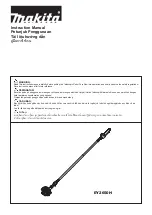
ORIGINAL INSTRUCTIONS
16
Intended use
The crosscut, drag and mitre saw is designed to crosscut wood respective of the machine’s size. The
saw is not designed for cutting firewood.
Warning!
Do not use the saw to cut materials other than those specified described in manual.
Warning!
The supplied saw blade is only intended for the sawing of wood! Do not use this blade for the sawing of
firewood!
The equipment is to be used only for its prescribed purpose.
Any other use is deemed to be a case of misuse. The user / operator and not the manufacturer will be
liable for any damage or injuries of any kind caused as a result of this.
The equipment is to be operated only with suitable saw blades. It is prohibited to use any type of cutting
wheel.
To use the equipment properly you must also observe the safety information, the assembly instructions
and the operating instructions to be found in this manual.
All persons who use and service the equipment have to be acquainted with this manual and must be
informed about the equipment’s potential hazards. It is also imperative to observe the accident
prevention regulations in force in your area. The same applies for the general rules of health and safety
at work.
The manufacturer will not be liable for any changes made to the equipment nor for any damage
resulting from such changes. Even when the equipment is used as prescribed it is still impossible to
eliminate certain residual risk factors. The following hazards may arise in connection with the machine’s
construction and design:
• Contact with the saw blade in the uncovered saw zone.
• Reaching into the running saw blade (cut injuries).
• Kick-back of workpieces and parts of workpieces.
• Saw blade fracturing.
• Catapulting of faulty carbide tips from the saw blade.
• Damage to hearing if hearing protection are not used as necessary.
• Harmful emissions of wood dust when used in closed rooms.
Please note that our equipment has not been designed for use in commercial or industrial applications.
Before starting the equipment
• Open the packaging and remove the device carefully.
• Remove the packaging material as well as the packaging and transport bracing (if available).
• Check that the delivery is complete.
• Check the device and accessory parts for transport damage.
• If possible, store the packaging until the warranty period has expired.
ATTENTION
The device and packaging materials are not toys! Children must not be allowed to play with
plastic bags, and small parts! There is a risk of swallowing and suffocation!
•The equipment must be set up where it can stand securely. Secure the machine on a workbench or a
base frame with 4 screws (not included in delivery) using the holes on the fixed saw table(15).
• Pull out the pre-installed tilt protection (36) completely and secure it with an Allen key.
• All covers and safety devices have to be properly fitted before the equipment is switched on.
• It must be possible for the blade to run freely.
• When working with wood that has been processed before, watch out for foreign bodies such as nails
or screws, etc.
• Before you press the ON/OFF switch, check that the saw blade is fitted correctly. Moving parts must
run smoothly.
• Before you connect the equipment to the power supply make sure the data on the rating plate are
identical to the mains data.
Summary of Contents for FSO20254
Page 10: ...ORIGINAL INSTRUCTIONS 10 3 DESCRIPTION...
Page 12: ...ORIGINAL INSTRUCTIONS 12 4 USE...
Page 13: ...ORIGINAL INSTRUCTIONS 13...
Page 14: ...ORIGINAL INSTRUCTIONS 14...











































